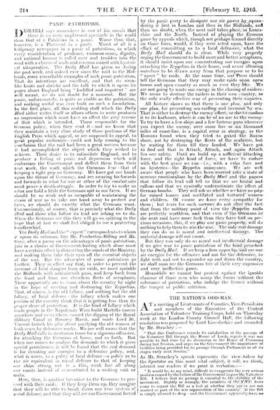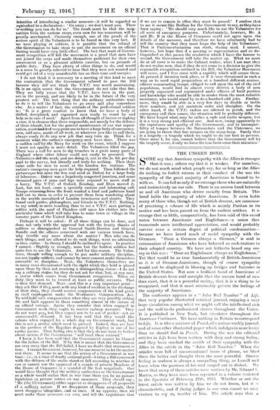THE NATION'S ODD-MAN..
AT a meeting of Lieutenants of Counties, Viee7Presidents and members of the Executive of - the Central. Association of Volunteer Training Corps, Iteld.on 'Thursday week at the London County Council Hall, the JolloWing resolution was proposed by Lord Lincolnshire and seconded by Mr: Strachey - "That this Conference records its satisfaction at the pa.siage of the Volunteer Bill through the House of Lords, regrets it wai not possible to 'find time for its discussion in . the House of Commons during last Session, and urges on the-Covernment-the importance of facilities being provided for its passage through Parliament. in all its stages early next Session."
. As Mr. Strachey's speech represents the view ;taken by the Spectator on this - most vital subject; it will; ,we think, interest our readers if we print it verbatiM:— -- - - . . It would be, to my mind, difficult to exaaaerate.the,y serious
..
i loos
Here, then, ire another incentive to the Germans to pro- Bill. I believe that its passage is csiontial. to the.'Stabitity of the come to regard the-Bill as a test of 'whether they are. 04. arc; not forced _ wanted as part of the war organization of -the 66Lniti.: If the -gill intention of introducing a similar measure—it will be regarded as equivalent to a declaration : ' Go away ; . we don't want you. There 'is riothing you can do for us.". The result:must be that . the:resig- nations from the various cerpsieven now far AO's-numerous; will be greatly: accelerated:a:Curiously enough; one of the proofs of the serious spirit of the Volunteers is to be found in this very fact. If we were playing at soldiers, it is possible that the refusal of ;the Government to -take steps. to- put_the movement on an official feoting tiould'ha-Ve very little.effect. The fact that want of Govern- ment recognition -will•kill the movement is a proof that men have- not joined the corps and made themselves proficient for their own- amusement or as a pleasant athletic exercise, but on grounds of public duty. - They have plenty of other things to do, and would; in a sense be greatly relieved- to hear that they were not wanted and, could get rid'of a very considerable tax on their time and energies.
I do not think it is necessary in a meeting of this kind to meet, the contention that the Government refused to pass the Bill: because they did" not' think the V.T.C. was worth maintaining. I ie. an -open secret, that the. Government. do not take that line. They are fully 'aware that the V.T.C. have been in the past, are in the- present; and-are likely. to be in- the future of the very, greatest use: The-- last thing that the military authorities want' todo is to tell-the. Volunteers to go away and- play somewhere else. As a matter of fact, the attitude of the professional soldiers is it is a egreat comfort to know that we have a body of drilled, disciplined; and organized_ men ready to stand by and help us in case need." Apart from all thought of 'finesse or making a case; it is obvious-that those responsible, not merely for the defence of these islands-abut -for the general maintenance of. our war organi- zation, mustafinditof very great useterha,ve a large body of emergency- -- men, odd-men; maids-of-all work; or whatever you like to call them, always ready tbsdo any new job that may turn up. Think for a moment what-the.-nation's emergency-men- have done. , There was a sudderacellslaysthe -Navy for work-on the coast, -which I suppose I must not specify, in more detail. The Volunteers filled the gap. There was a call for men to dig trenches in a gresit many parts of England where other labour could- not easily be procured. The sVolunteers-didstheworka and-axe-del-Sig-it; not at-the:3s. lid:-per day paid to the naintyabut literally-and truly for nothing. Then there eaine calls for men to assist at the London fire stations. The nation's emetgeeey-men gave.the help required Then followed the pieturesquesbutaionestheless real need- at Dideot for a large body of labourersaallideot was a hopelessly congested junction,-and: some . thousand-pairs of arms and legs were. required to move stuff in a hurry.- The V.T.C. of Oxford,- Reading, and Eton moved. it. Last, but not least; came a specially curious and interesting call: -Troopiareturningrfron the front-Wanted a kind. and judicious hand held out to them in order to prevent them from wandering about in the worldia unrealized. of London terminuses and streets. They found sueNgiddesa philosophers, and friends in the V.T.C. Nothing, to my mincleiss more touching than' to 'see a V.T.C. man putting a soldier withatheaniud. of Flanders still upon his clothes into the "partidular train which will take him to some town or village in the . remoter parts of the United Kingdom. .
- Perhapi= itswili be asked : If all those things can be done,, and done notsonlyawithathe approval but with the hearty thanks of : soldiers so distinguished as General Smith-Dorrien and General . Rundle sandsthea officers . concerned with our. various trench lines, why trouble - any More about, the matter ? Men who can do - such things; and-are allowed to- do such things, want no alteration in their status: --In theory I shotildbeitielined-to agree. In practice - I-cannot. - Rightly or wrongly, none but the boldest -soldiees feel. quite free-to use the Volunteers.; And. for: this reaaon. The Volum., Leers, though-swill:Mg enough to- be put under military discipl nea are.not legaillyseltfiers;-andcannothymere consent :make themselves. amenable to. disciplines:- Next,: the sVoltmteers themselves are: in many eases discontented with the slight which they hold is placed: upon them by their not receiving asdistinguishing status—I do not say a mill:tiny-statues for thoy:do- not ask for that,ibut, at any rate, a statue which . comes -from. Government. recognition. When on day, they want, to. be treated at. least as publics servants. That is their firstdemand. Next-a-and:this is a very important point— they ask that if they,meetswith any kind. of. accident in the discharge of their duty, they should receive: compensation of the kind given' in civic- employment -under the -Workmens Compensation Act. To withhold such compensation when they arc very possibly risking. life and limb appears to them something almost an the nature of an effitial- outrage. Again; they .consider that when engaged in' Government work .they -ought to receive railway- warrants. They do not want pay, but they. expect not to be out of pocket—not an: unreasonable demand. It has been said that they would like rations when' engaged for a whole day on Government work, but this is not a matter which need-be pressed: Indeed, they arc here in .the position of the Regulars depicted by Kipling in one of his: earlier poems. Their feeling also is that. they do not want to bother about rations if the Government " will 'treat them rational." I know it has been said that the Governinent cannot be blamed ` for the faiffire of the Bill: -1f-by this is meant that the GOverninene . are very sorry. that the Bill_failed, I have no doubt that statement is - true. I cannot-he content, however, for one moment to let the matter rest there. It seems to me that the notion of a Government in war - time—i.e., in a time of deadly national perilasletting a' Bill concerned • With: the, defence- of the .realm•stantb or fall. according -to-whether can or cannot. win the approval-of 4.couple. of private Members ok the Howse of .Comm a. scandal of the first magnitude. Ond would-have thought that the Military authorities' or the Government ' as-a whole would realize that- iii. War time there ran be no private legislation oz private vetoes on "war measures. They should say !Mc (theIGOvernment) either approve or. disapprove of all proposal:! of . a military nature.'if we disapprove of thoie proposals,' they mrist- disappear 'altogether, sang ate once. -.I.i.we approve, then wel - must make those measures our own, and tell the Legislature that if we are to remain in office they must he passed.' I enema that to me it seemtelike Bedlam for the Government to say, aethey have been saying : "We should very much like to use the Volunteers for - all sorts of emergency purposes. Unfortunately, however, Mr. A and Mr. B in the House of Commons could not agree upon the details of the measure, and therefore we have reluctantly had- to tell the country that they must forgo the help of the Volunteers.' That is Parliamentarianism run stark, staring mad. I cannot, however, but hope that if a meeting so representative and so dis- tinguished as this passes the resolution which I have the honour to second; the Government wilt take the matter up. What we must do at all costs is.to make tho Cabinet realize, what I am sure they do not realize now, that if they do not come to a decision to give the reasonable recognition outlined in the Bill, the Volunteer Movement will cease, and I fear cease with a rapidity which will amaze them. At present if invasion took place, or if it were threatened in such a way as to need rapid- preparation at a hundred different -centres, officers commanding troops, obliged to call upon the aid of the civil population,. would find in almost every district a body of men properly organized and regimented under officers of focal-positieni and knowledge who would be able to render them the most valuable assistance, who would stand by to do a hundred odd jobs. Further- more, they would be able in a very few days to double or treble their numbers, and yet maintain order and discipline. On- the other hand, if the V.T.C. cadres are allowed to perish, and the emergency call then comes, the situation will be perfectly different. We hive forged what may be rather a rude and rustic weapon, but it is a very strong and efficient one. And now, owing apparently to the supineness and apathy of the Government, and to incompati- bility of temper between the Nationalists and the Ulstermen, we are going to throw that fine weapon on the scrap-heap. Surely that is a tragedy—a tragedy which we ought to do our best, to prevent. Once more I, for one, cannot believe that the Government will let the tragedy occur, if only we force the true facts linen their attention:.



































 Previous page
Previous page